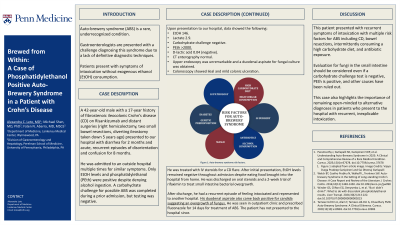Tuesday Poster Session
Category: IBD
P4431 - Brewed from Within: A Case of Phosphatidylethanol Positive Auto-Brewery Syndrome in a Patient with Crohn’s Disease
Tuesday, October 29, 2024
10:30 AM - 4:00 PM ET
Location: Exhibit Hall E

Has Audio

Alexandra Leto, MD
University of Pennsylvania
Philadelphia, PA
Presenting Author(s)
Alexandra Leto, MD, Michael Shen, MD, PhD, Faten Aberra, MD
University of Pennsylvania, Philadelphia, PA
Introduction: Auto-brewery syndrome (ABS) is a rare under-recognized condition that is difficult to diagnose. Patients (PTs) present with symptoms of intoxication without exogenous ethanol (EtOH) consumption.
Case Description/Methods: A 42-year-old male with a 17-year history of fibrostenoic ileocolonic Crohn’s disease (CD) on Risankizumab and distant surgeries (right hemicolectomy, two small bowel resections, diverting ileostomy taken down 5 years ago) presented to our hospital with diarrhea for 2 months and acute, recurrent episodes of disorientation and confusion for 8 months. He was admitted to an outside hospital multiple times for similar symptoms. Only EtOH levels and phosphatidylethanol (PEth) were positive despite denying alcohol ingestion. A carbohydrate (CH) challenge for possible ABS was completed during a prior admission, but testing was negative. Upon presentation to our hospital, labs were notable for EtOH level 146 and lactate 2.9. PT underwent repeat CH challenge that was negative. PEth eventually resulted as >2000. D-lactic acid was also sent. CT enterography was normal. Upper endoscopy was unremarkable and a duodenal aspirate for fungal culture was obtained. Colonoscopy showed ileal and mild colonic ulceration. He was treated with IV steroids for a CD flare. After initial presentation, EtOH levels remained negative throughout admission despite eating food brought into the hospital from home. He was discharged on oral steroids and a 2-week trial of rifaximin to treat small intestine bacterial overgrowth. After discharge, he had a recurrent episode of feeling intoxicated and represented to another hospital. His d-lactic acid eventually resulted at 0.04 (negative). His duodenal aspirate also came back positive for candida suggesting an overgrowth of fungus. He was seen in outpatient clinic and prescribed fluconazole for 14 days for treatment of ABS. The PT has not presented to the hospital since.
Discussion: This PT presented with recurrent symptoms of intoxication with multiple risk factors for ABS including CD, bowel resections, intermittently consuming a high CH diet, and antibiotic exposure. Evaluation for fungi in the small intestine should be considered even if a CH challenge test is negative, PEth is positive, and other causes have been ruled out. This case also highlights the importance of remaining open-minded to alternative diagnoses in patients who present to the hospital with recurrent, inexplicable intoxication.
Disclosures:
Alexandra Leto, MD, Michael Shen, MD, PhD, Faten Aberra, MD. P4431 - Brewed from Within: A Case of Phosphatidylethanol Positive Auto-Brewery Syndrome in a Patient with Crohn’s Disease, ACG 2024 Annual Scientific Meeting Abstracts. Philadelphia, PA: American College of Gastroenterology.
University of Pennsylvania, Philadelphia, PA
Introduction: Auto-brewery syndrome (ABS) is a rare under-recognized condition that is difficult to diagnose. Patients (PTs) present with symptoms of intoxication without exogenous ethanol (EtOH) consumption.
Case Description/Methods: A 42-year-old male with a 17-year history of fibrostenoic ileocolonic Crohn’s disease (CD) on Risankizumab and distant surgeries (right hemicolectomy, two small bowel resections, diverting ileostomy taken down 5 years ago) presented to our hospital with diarrhea for 2 months and acute, recurrent episodes of disorientation and confusion for 8 months. He was admitted to an outside hospital multiple times for similar symptoms. Only EtOH levels and phosphatidylethanol (PEth) were positive despite denying alcohol ingestion. A carbohydrate (CH) challenge for possible ABS was completed during a prior admission, but testing was negative. Upon presentation to our hospital, labs were notable for EtOH level 146 and lactate 2.9. PT underwent repeat CH challenge that was negative. PEth eventually resulted as >2000. D-lactic acid was also sent. CT enterography was normal. Upper endoscopy was unremarkable and a duodenal aspirate for fungal culture was obtained. Colonoscopy showed ileal and mild colonic ulceration. He was treated with IV steroids for a CD flare. After initial presentation, EtOH levels remained negative throughout admission despite eating food brought into the hospital from home. He was discharged on oral steroids and a 2-week trial of rifaximin to treat small intestine bacterial overgrowth. After discharge, he had a recurrent episode of feeling intoxicated and represented to another hospital. His d-lactic acid eventually resulted at 0.04 (negative). His duodenal aspirate also came back positive for candida suggesting an overgrowth of fungus. He was seen in outpatient clinic and prescribed fluconazole for 14 days for treatment of ABS. The PT has not presented to the hospital since.
Discussion: This PT presented with recurrent symptoms of intoxication with multiple risk factors for ABS including CD, bowel resections, intermittently consuming a high CH diet, and antibiotic exposure. Evaluation for fungi in the small intestine should be considered even if a CH challenge test is negative, PEth is positive, and other causes have been ruled out. This case also highlights the importance of remaining open-minded to alternative diagnoses in patients who present to the hospital with recurrent, inexplicable intoxication.
Disclosures:
Alexandra Leto indicated no relevant financial relationships.
Michael Shen indicated no relevant financial relationships.
Faten Aberra: Abbvie – Grant/Research Support. Bristol Myers Squibb – Advisor or Review Panel Member. Janssen – Advisor or Review Panel Member, Grant/Research Support. Pfizer – Advisor or Review Panel Member, Grant/Research Support. UCB – Grant/Research Support.
Alexandra Leto, MD, Michael Shen, MD, PhD, Faten Aberra, MD. P4431 - Brewed from Within: A Case of Phosphatidylethanol Positive Auto-Brewery Syndrome in a Patient with Crohn’s Disease, ACG 2024 Annual Scientific Meeting Abstracts. Philadelphia, PA: American College of Gastroenterology.

